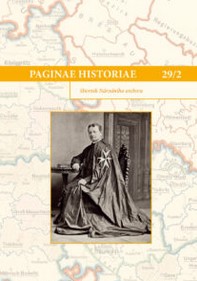SUDETŠTÍ NĚMCI JAKO OBERLANDRÁTI V PROTEKTORÁTU ČECHY A MORAVA
SUDETENLAND GERMANS AS OBERLANDRATS IN THE PROTECTORATE OF BOHEMIA AND MORAVIA
Author(s): Monika Sedláková, Zdeňka KokoškováSubject(s): Governance, Political history, Government/Political systems, Interwar Period (1920 - 1939), WW II and following years (1940 - 1949), Fascism, Nazism and WW II
Published by: Národní archiv
Keywords: Sudetenland Germans; Oberlandrats; Protectorate of Bohemia and Moravia;
Summary/Abstract: After establishing the Protectorate of Bohemia and Moravia, the territory was divided into parts called Oberlandrats. The established occupational offices then represented the lowest administrative authority for German citizens and they had simultaneously a managing and controlling function of the protectorate district and local authorities. In May 1942, during Heydrich’s administrative reform, most of the agenda was transferred onto autonomous protectorate offices and thus there was an established administration by the command from Reich. The heads of the offices were newly designated as inspectors of Reich’s Protector (the German State Minister from August 1943) with managing and inspecting activities in relation to some sta-tions of occupational administration and formerly to the Czech offices. Gradually, 53 officers changed to the service position of oberlandrat. They were Reich-German citizens, with verified racial origin, coming from all parts of the German Reich, later also from annexed Austria and the Czechoslovak borderland. They were university educated state officials with the NSDAP (National Socialist German Workers´ Party) membership card, often members of other Nazi organisations. After WWII, few of them were tried by Czechoslovak extraordinary people´s courts, most of the others by German denazification arbitration chambers. Three oberlandrats were of Czech origin – Hans Balaschek, Friedrich Remplik and Gustav Jonak. All of them had come from well-situated German families, they graduated in law from the German University in Prague and left for solicitor practice. In the thirties, they were influenced by German nationalism and the anti-Czechoslovak mood in the Bohemian borderland. As the members of Sudeten German Party, they were accepted to the NSDAP in November 1938. Only Friedrich Remplik worked his way up to the position of the head of Pilsen Oberlandrat all by himself. The other two had influential friends. Hans Blaschek was a brother-in-law of Karl Hermann Frank and during the whole occupation he was supported in functions which the usual German official in the protectorate did not have the right to hold. He was appointed to lead the office of Oberlandrat in České Budějovice in October 1943. Gustav Jonak, too radical even for Konrad Henlein, left for Berlin and won Reinhard Heydrich’s favour there. On the basis of his decision and after the reform he gained administration of economically the most important territory of the Protectorate i. e. Ostrava region. All three men worked in the function of the oberlandrat – inspectors till the end of the war, then they went through the prison camps and were delivered to Czechoslovak courts. After serving their sentences for the Nazi past, they left for west Germany and took part in either federal or land administration, similarly as most other former Reich´s officials.
Journal: Paginae Historiae
- Issue Year: 29/2021
- Issue No: 2
- Page Range: 121-159
- Page Count: 39
- Language: Czech

